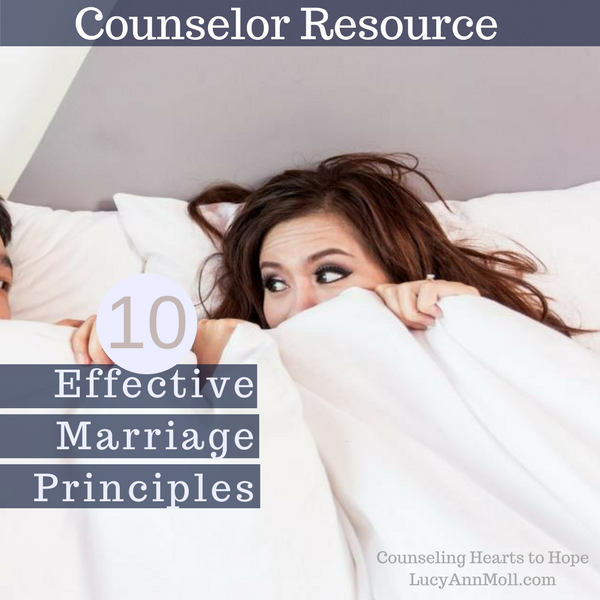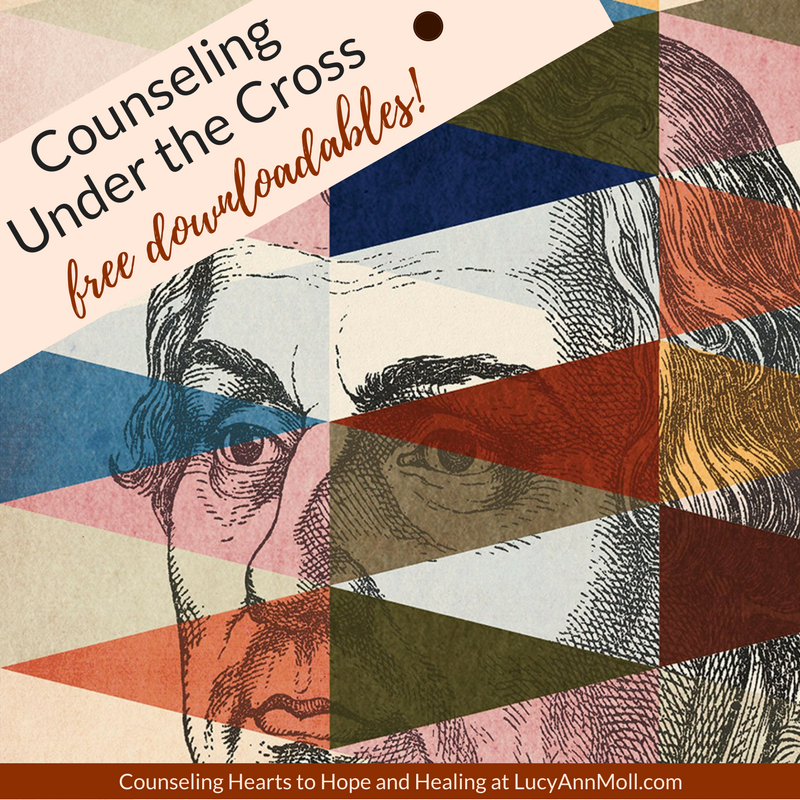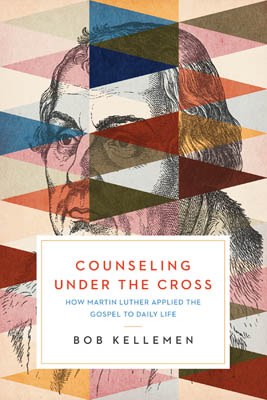
by Lucy | May 16, 2018 | biblical counseling, emotions |
I made a monster counseling mistake . . . as a counselee. My mistake?
Assumptions! I wrongly assumed a Christian counselor would counsel according to the truths of the Bible.
Click & Tweet!
Before continuing, may I say this? There are wise Christian counselors trained as professional state-licensed counselors who counsel hurting people with the gospel of Christ. Perhaps you’ve received help from one of them. Maybe they pointed you to Jesus and to God’s words as the answer to your emotional problems. You are fortunate. That wasn’t my story.
Why I needed counseling: I was an emotional wreck. My thoughts raced, my appetite plummeted, and memories of sexual molestation in childhood by one family member and deep rejection by another bubbled up and I freaked.
My husband witnessed my tears, even my wailing coming from deep deep inside, a hiding place only God knew existed. My anger stuck him too. I tried to act normal near our four-year-old daughter. Now nearing 30, she says she doesn’t remember anything unusual about that tumultuous year. No doubt she picked up my tension and inattentiveness. When stressed I plopped her in front of the TV.
But Barney the Purple Dinosaur is a poor “babysitter” when a kid needs her mom, don’t you agree?
How the Counseling Mistake Began
Back in the 1990s, I thumbed the Yellow Pages, landed on “mental health” and picked a Christian counselor based on the word “Christian.” When I phoned his office, I failed to ask questions about his counseling approach. The listing said he got his degree from a well-respected Christian college, so he’d steer me to Jesus, right? Wrong.
My counselor, though a Christian, was a proponent of psychodynamic psychotherapy, including transference, a Freudian tool. Transference messed me up big.
Here’s a definition of transference:
In psychiatry, the unconscious tendency of a patient to assign. . .to the therapist of feelings and attitudes associated with a parent or similar person from childhood. The feelings may be affectionate (positive transference), hostile (negative transference), or ambivalent.
My counselor said through transference, I’d experience healing. Instead I became more confused, more anxious, more depressed. He said feeling a lot worse was also part of healing. To crunch this story into a sentence: I had dump this counselor.
From Counseling Mistake to Real Hope
Desperate for peace and wooed by Christ, I looked to biblical truth for the answers to my emotional pain. Like Elyse Fitzpatrick before me — who shares in Love to Eat, Hate to Eat how she ran to Christ and listened to God’s words to overcome an eating disorder — I also counseled myself with God’s words. God healed me of depression, though anxiety hung on.
A few years after the black cloud lifted, I stumbled on books on true Christian counseling, which I and others call biblical counseling. What a difference!
Biblical counseling weaves together God’s love and truth. It is comprehensive biblical wisdom and compassionate Christlike care. It addresses life’s problem (emotional and mental) with the hope Christ offers.
Here’s how Bob Kellemen describes the hope of biblical counseling in Gospel-Centered Counseling.
- Biblical counseling helps you and me to develop confidence in how we understand and view the Bible and real life.
- Biblical counseling helps you and me to develop the competence to use God’s words in solving real life issues.
We All Have Bad Days, Right?
Of course I still have bad days. And I keep making one mistake after another. We all do. My ongoing struggle with anxiety ended about three years ago when I took a very scary (to me!) chance and applied God’s words, no matter my feelings, to my various fears, including a highway driving phobia.
God continues to teach me who I am in Christ — loved, chosen, redeemed, forgiven, and more — and show me who he is: loving, compassionate, good, and holy. These are life-giving, hope-enlarging lessons. You see, I used to picture God as a dark, creepy giant ready to squash me for the tiniest mess-up. This is why I tried to be a good girl while believing lies that God screwed up when he made me.
Do you believe lies too?
Does Satan mess with your mind and convince you to believe his lives?
How My New Hope Became a Ministry
As God comforted me, I now comfort others through the ministry of biblical counseling. For nearly 20 years, I’ve counseled women and families in person and by Skype/FaceTime/WhatsApp, using the word of God, and modeling care.
Blessed be the God and Father of our Lord Jesus Christ, the Father of mercies and God of all comfort, who comforts us in all our affliction, so that we may be able to comfort those who are in any affliction, with the comfort with which we ourselves are comforted by God. 2 Corinthians 1:3-5, ESV
Counselees come with every sort of life struggle. Among them are a young mom who experienced panic attacks, a 30-something woman in an difficult marriage, a confused college-age 20 year old who self-injures, a wife who feels rejected by her husband, a woman dealing with addiction, and many more.
Would you like help? I encourage you to reach out to a family member, a friend, or a pastor for help. If you’re interested you could learn more about biblical counseling in person on by Skype/FaceTime/WhatsApp.
COUNSELING: Would you like a free consultation by phone to see whether biblical counseling could help you personally? Please contact me and let’s set it up.
Counseling Hearts to Hope,

by Lucy | Feb 28, 2017 | biblical counseling, relationships

Your life story has two editors–Satan and Christ. One shames, the other gives you grace. Who will title your life story. This article by Pastor Bob Kellemen appeared first here on his website and is used with permission. Bob is a leader in the biblical couseling movement, an author, and a college vice president.
Two Editors to Your Life Story
Your life is a story.
And two people seek to write the title to your story.
Satan’s Shaming Story
Satan seeks to title your life story using the lens of shame, guilt, sin, and condemnation.
Satan’s story is the story of the law…which condemns.
Christ’s Grace Story
The Author of Life is the only One with the right to name your story.
He—Christ Jesus—names your story through the lens of grace, forgiveness, the cross, justification, reconciliation, regeneration, and redemption.
Consider David—Through Satan’s Law Lens
If King David were to allow Satan to write the title to his life story, what would that title be?
“The King of Sin and Shame!”
“Adulterer!”
“Murdered!”
“Hypocrite!”
“Shameful Failure!”
Consider David—Through Christ’s Gospel Lens
Instead…Christ titles King David’s story. David ends up not in Satan’s Hall of Shame.
No. David ends up in Christ’s Faith Hall of Fame.
By faith the prostitute Rahab, because she welcomed the spies, was not killed with those who were disobedient. And what more shall I say? I do not have time to tell about Gideon, Barak, Samson, and Jephthah, and about David and Samuel and the prophets. who through faith conquered kingdoms, administered justice, and gained what was promised; who shut the mouths of lions, quenched the fury of the flames, and escaped the edge of the sword; whose weakness was turned to strength; and who became powerful in battle and routed foreign armies. (Hebrews 11:31-34)
Did you catch wh o made Christ’s Faith Hall of Fame?
o made Christ’s Faith Hall of Fame?
Rahab—the prostitute—is there—by faith.
David—the Adulterer-Murderer—is there—by faith.
That’s not enough? Here’s Christ’s title to David’s life story:
“Man After God’s Own Heart.”
Here it is, right in inspired, inerrant Scripture:
After removing Saul, he made David their king. God testified concerning him: ‘I have found David son of Jesse, a man after my own heart; he will do everything I want him to do.’ From this man’s descendants God has brought to Israel the Savior Jesus, as he promised. (Acts 13:22-23)
David’s life story is sandwiched by grace. By grace he is a man after God’s own heart. In the flesh he sins gravely. By grace from David’s descendants God brings forth our Savior Jesus.
Let the Gospel Rewrite the Title to Your Life Story
Martin Luther understood how Christ’s gospel of grace rewrites our sinful, shameful life story. Luther points us to the center of Scripture—the comfort of the gospel.
“It is a falsehood, that God is an enemy of sinners, for Christ roundly and plainly declares, by commandment of the Father: ‘I am come to save sinners.’”
When we are tempted by the devil to doubt the grace of God, Luther encourages us to fight Satan’s condemning lies with gospel-grace truth.
When the devil casts up to us our sin, and declares us unworthy of death and hell, we must say: ‘I confess that I am worthy of death and hell. What more have you to say?’ ‘Then you will be lost forever!’ ‘Not in the least: for I know One who suffered for me and made satisfaction for my sins, and his name is Jesus Christ, the Son of God. So long as he shall live, I shall live also.’
Spit on the Devil
Luther continues…
Therefore treat the devil thus: Spit on him, and say: ‘Have I sinned? Well, then I have sinned, and I am sorry; but I will not on that account despair, for Christ has borne and taken away all my sin, yes, and the sin of the whole world, if it will only confess its sin and believe on Christ. What should I do if I had committed murder or adultery, or even crucified Christ? Why, even then, I should be forgiven, as he prayed on the cross: ‘Father, forgive them’ (Luke xxiii. 34). This I am in duty bound to believe. I have been acquitted. Then away with you, devil!’
Luther urges us to “depend boldly upon this” in order to experience peace with God.
Christ is not the one who accuses or threatens us, but he reconciles and intercedes for us by his own death and by his shed blood for us, that we may not be afraid of him, but draw near to him with all confidence.
Luther counsels us to draw near to Christ with full confidence and assurance of his love. Awareness of God’s grace friendship has the power to entice prodigals to return home to the Father.
Believe that he esteems and loves you more than does Dr. Luther or any other Christian. The conscience, spurred by the devil, the flesh, and the fallen world; says, “God is your enemy. Give up in despair.” God, in His own Fatherly love and through His Son’s grace and through His Word and through the witness of His people; says, “I have no wrath. You are accepted in the beloved. I am not angry with you. We are reconciled!”
Title Your Story through the Lens of the Gospel
Who is writing the title to your life story?
Click & Tweet!
Is it Satan—through his condemning/law narrative?
Or…
Is it Christ—through His grace/gospel narrative?
Join the Gospel Conversation
What is Christ’s grace-gospel title to your life story?
Sharing Hope with Your Heart,

by Lucy | Jan 10, 2017 | biblical counseling, book reviews
 Books, books, and more books. Here are the top biblical counseling books of 2016, rounded up by guest writer Dr. Bob Kellemen. Enjoy!
Books, books, and more books. Here are the top biblical counseling books of 2016, rounded up by guest writer Dr. Bob Kellemen. Enjoy!

If you are a counselor, pastor, student, one-another minister, small group leader, or spiritual friend, you want to know the most helpful books about the personal ministry of the Word— using God’s Word for helping hurting people.
Here, in alphabetical order, are the top 16 books published in 2016 about biblical counseling or important to biblical counselors.
I’ve selected these books on the basis of their biblical depth, relevance to life, practicality for one-another ministry, faithfulness to the sufficiency of Scripture, application to progressive sanctification, and by surveying what leaders in the biblical counseling world are saying about them.
1. Biblical Church Revitalization
Biblical Church Revitalization: Solutions for Dying and Divided Churches, by Brian Croft, Christian Focus
Biblical counseling is a discipleship ministry of the local church with a mission not simply to be a church with biblical counseling, but a church of biblical counseling. The biblical counseling vision is to saturate the entire congregation with confidence in the sufficiency of Scripture for daily life and ministry. Brian Croft shares that mission and vision. His book, Biblical Church Revitalization, is like engaging in a dozen biblical counseling sessions—for the whole congregation. Pastor Croft walks readers through the process of biblical church health—church progressive sanctification. Every church can benefit greatly from his wise biblical counsel for congregational renewal.
You can read a review of Biblical Church Revitalization by Erik Raymond here.
2. Biblical Counseling Guide for Women
The Biblical Counseling Guide for Women, by John Street and Janie Street, Harvest House
As the modern biblical counseling movement has matured, its resources have progressed from foundational materials for general counseling issues to in-depth materials for specific counseling needs. The husband and wife team of John and Janie Street model this development in their book The Biblical Counseling Guide for Women. They use real-life vignettes, biblical wisdom, and counseling principles to address 17 relevant issues that women commonly face. The embedded discussion questions make this book valuable not only for individual use, but also for small group interaction.
You can read a review of The Biblical Counseling Guide for Women by Jenny Bergren here.
3. Counseling One Another
Counseling One Another: A Theology of Interpersonal Discipleship, by Paul Tautges, Shepherd Press
In Counseling One Another, Paul Tautges builds the theological underpinning for biblical counseling in a way that is both comprehensive and compassionate. This book demonstrates a staunch commitment to an expository, exegetical examination of counseling as presented in God’s Word. Any pastor or lay person wanting a foundational starting point for understanding Christ-centered, comprehensive, and compassionate biblical counseling in the local church would be wise to read and apply Counseling One Another.
You can read a review of Counseling One Another by Zack Ford here.
4. Devoted to God
Devoted to God: Blueprints for Sanctification, by Sinclair Ferguson, Banner of Truth
Glorifying God by becoming more like Christ is the heartbeat of biblical counseling. Sinclair Ferguson shares that passion. In Devoted to God, he offers a lifetime of biblical study as he exegetes 10 central biblical passages about progressive sanctification. His gospel-centered, relevant, practical, in-depth approach makes this an instant classic on the topic of growth in grace.
You can read a review of Devoted to God by Tim Challies here.
5. Discipling
Discipling: How to Help Others Follow Jesus, by Mark Dever, Crossway
Mark Dever’s latest book, Discipling, is part of the Nine Marks Ministries series “Building Healthy Churches.” Like each book in the series, it is a succinct yet robust biblical exploration of local church ministry. Just as biblical counseling seeks to equip the entire congregation for one-another ministry, so Discipling aims to cultivate a discipleship mindset throughout the entire body of Christ. As the subtitle suggests, this book provides the how-to of congregational discipleship.
You can read a review of Discipling by Casey McCall here.
6. Do Ask, Do Tell, Let’s Talk
Do Ask, Do Tell, Let’s Talk: Why and How Christians Should Have Gay Friends, by Brad Hambrick, Cruciform Press
Brad Hambrick thinks deeply about complex life and ministry situations. That’s certainly the case in Do Ask, Do Tell, Let’s Talk. He notes that most conversations about same-sex attraction have become polemical and political rather than pastoral and personal. His desire in this book is to be a resource God uses to grow His people into excellent ambassadors—friends to their classmates, colleagues, and family members who experience same-sex attraction.
You can read a review of Do Ask, Do Tell by Sam Allberry here.
7. The Dynamic Heart
The Dynamic Heart in Daily Life: Connecting Christ to Human Experience, by Jeremy Pierre, New Growth Press
A stereotype of the biblical counseling movement states that biblical counselors focus primarily on external behavior. Jeremy Pierre’s work, The Dynamic Heart in Daily Life, should put that perception to rest. Dr. Pierre presents a compassionate, comprehensive biblical understanding of people—image bearers who are spiritual, relational, social, rational, volitional, motivational, emotional, and physical beings. He examines every aspect of the heart in light of our coram Deo existence—we were designed as in-relationship-to-God beings. Pierre demonstrates how a biblical psychology (understanding of the soul) is essential for biblical counseling (bringing Christ’s redemptive hope to the whole person).
You can read a review of The Dynamic Heart by Theron St. John here.
8. Good and Angry
Good and Angry: Redeeming Anger, Irritation, Complaining, and Bitterness, by David Powlison, New Growth Press
David Powlison is a brilliant thinker. He also happens to be an extremely compassionate counselor. That combination is fully evidenced in Good and Angry. With winsome wisdom, Dr. Powlison enlightens us to the God-intended purpose of righteous anger and to Christ-redemptive hope for addressing unrighteous anger. This book is not just helpful for anger; it is a model for how we can take every aspect of our emotionality to the cross.
You can read a review of Good and Angry by Tim Challies here.
You can read a review of Good and Angry by Erik Raymond at The Gospel Coalition here.
9. Home
Home: How Heaven and the New Earth Satisfy Our Deepest Longings, by Elyse Fitzpatrick, Bethany House
Penned by Elyse Fitzpatrick, Home is not a journey-to-heaven-and-back tell-all memoir. Thankfully. Instead, it is a long-for-heaven-and-live-for-earth biblical narrative. We often hear, “that person is so heavenly minded that they are of no earthly good.” Home encourages us to be so heavenly minded that we are of great earthly good. Even more than that, it invites us to sample a small taste now of the eternal banquet of relational satisfaction we will experience when we are forever home with our heavenly Father.
You can read a review of Home by Aimee Byrd here.
10. Marry Well, Marry Wisely
Marry Well, Marry Wisely: A Blueprint for Personal Preparation, by Ernie Baker, Shepherd Press
In Marry Well, Marry Wisely, Ernie Baker pens a pre-pre-martial manual. In doing so, he doesn’t simply equip us to answer the question, “How do I choose the right spouse?” More importantly, he prepares us to answer the heart question, “How do I become prepared to be the right spouse?” This blueprint establishes the firm groundwork of a Christ-centered and other-centered mindset that is essential for being a godly spouse.
You can read a review of Marry Well, Marry Wisely by Theron St. John here.
11. Parenting
Parenting: 14 Gospel Principles That Can Radically Change Your Family, by Paul Tripp, Crossway
Few things seem to drive us toward an external focus more than the challenges of parenting. Everything inside and around us screams, “Fix it fast!” In, Parenting, Paul Tripp directs us away from a “fix it” focus to a focus on love Him (God) and love your child (care for your child’s heart). Tripp moves us away from a works-based, pharisaical mindset to a grace-based, gospel attitude in our homes.
You can read a review of Parenting by Heidi Strawser here.
12. Theology of Biblical Counseling
A Theology of Biblical Counseling: The Doctrinal Foundations of Counseling Ministry, by Heath Lambert, Zondervan
Of all 16 books on this list, A Theology of Biblical Counseling by Heath Lambert is the most important book for those wanting to understand the doctrinal basis of biblical counseling. Lambert, the Executive Director of the Association of Certified Biblical Counselors (ACBC), explains that “Counseling is a theological discipline” (p. 11). Lambert models that truth in each chapter, as doctrine comes to life in real ministry to real people—dramatically demonstrating how theology intersects with the lives of actual counselees.
You can read a review of A Theology of Biblical Counseling by David Dunham here.
13. Tying the Knot
Tying the Knot: A Premarital Guide to a Strong and Lasting Marriage, by Rob Green, New Growth Press
If Ernie Baker’s book (Marry Well, Marry Wisely) is a pre-pre-marital book, then Rob Green’s Tying the Knot covers the classical pre-marital topics. However, it does not cover them in the classical way—simply as relational skills to be mastered. Rather, this nine-session study directs couples through issues such as conflict, expectations, communication, finances, and intimacy—showing how couples can face each with Christ at the center of their marriage.
You can read a review of Tying the Knot by Tim Challies here.
14. The Vine Project
The Vine Project: Shaping Your Ministry Culture Around Disciple-Making, by Colin Marshall and Tony Payne, Matthias Media
The Vine Project by co-authors Colin Marshall and Tony Payne is the sequel to The Trellis and the Vine. In the prequel, Marshall and Payne cast the vision for an Ephesians 4:11-16 view of pastors as equippers. In The Vine Project, they put feet to that vision by providing practical insight into the local church disciple-making process.
You can read a review of The Vine Project by Kevin Halloran here.
15. Visual Theology
Visual Theology: Seeing and Understanding the Truth About God, by Tim Challies and Josh Byers, Zondervan
As a long-time follower of Tim Challies’ blog, I enjoyed the foundational material that eventually developed into Visual Theology. In the able hands of Challies and Josh Byers, those blog posts translate extremely well into book form. Visual Theology is powerful because it aligns with how God communicates in His Word, how Christ taught people, and how God designed our minds to think—visually, with imagination, in pictures and images. Biblical counselors can learn much from this book about communicating truths not only in words, but also in images and illustrations, especially to this visually-oriented generation.
You can read a review of Visual Theology by Aaron Armstrong here.
16. What Grieving People Wish You Knew
What Grieving People Wish You Knew about What Really Helps (and What Really Hurts), by Nancy Guthrie, Crossway
Nancy Guthrie is one of the foremost Christian writers on loss, grief, hope, and healing. What Grieving People Wish You Knew is the fruit of a lifetime of sharing the comfort she has received from Christ (2 Corinthians 1:3-5). Her narrative reads like a biblical counseling training manual for gospel conversations for suffering. Pastors, counselors, and spiritual friends can all learn much from her biblically compassionate writing.
You can read a review of What Grieving People Wish You Knew by Rachel Hurst here.

Dr. Robert W. Kellemen, Th.M., Ph.D.: Bob is the Vice President for Institutional Development and Chair of the Biblical Counseling and Equipping Department at Crossroads Bible College, and the Founder and CEO of RPM Ministries. Bob was the founding Executive Director of the Biblical Counseling Coalition. For seventeen years he served as the founding Chairman of and Professor in the MA in Christian Counseling and Discipleship department at Capital Bible Seminary in Lanham, MD. He has pastored three churches and equipped biblical counselors in each church. Bob and his wife, Shirley, have been married for thirty-six years; they have two adult children, Josh and Marie, one daughter-in-law, Andi, and three granddaughters, Naomi, Penelope, and Phoebe. Dr. Kellemen is the author of thirteen books including Gospel-Centered Counseling.





 Join the Reformation celebration!
Join the Reformation celebration! applied the gospel to suffering, sin, sanctification, and our
applied the gospel to suffering, sin, sanctification, and our 

 o made Christ’s Faith Hall of Fame?
o made Christ’s Faith Hall of Fame? Books, books, and more books.
Books, books, and more books.

